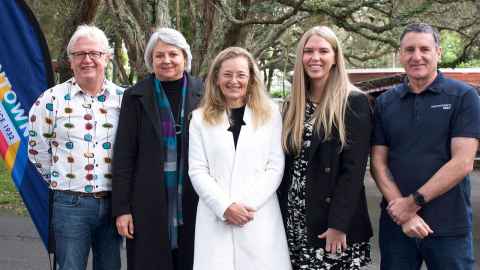Youth at risk to benefit from creative partnership
12 July 2022
Young people at risk of disengaging from education will directly benefit from a new partnership between the University of Auckland and Youthtown Inc.

The Centre for Arts and Social Transformation (CAST) at the University of Auckland will be able to continue its research into building resilience in young people through the arts, recreation, sports and music, thanks to a three-year funding commitment from Youthtown.
Centre director Professor Peter O’Connor says Youthtown and CAST have much in common, which makes the partnership a perfect fit.
“We both understand the central importance of play in people’s lives, not just for enjoyment, but as a way of testing and trying out new ways of knowing and being in the world. As we learn to live with Covid, research-informed and evidence-led youth development will be increasingly important in shaping how we respond to the challenges young people face.”
Youthtown CEO Fay Amaral is delighted to be collaborating for the benefit of young people in this way.
“Youthtown is proud to be part of the work to lift the profile of the importance of youth development work and engagement for our rangatahi through play; be that through art, recreation or sports.
“Our 90-year history and legacy is built on the foundation of connection, engagement and empowerment and the work being done at CAST will enable us to do more for our youth across Aotearoa.”
For young people to have successful life outcomes and be resilient in the face of challenges, it’s essential they have supportive relationships with important people in their lives.
The relationship is built on work already done with Youthtown on a programme called GROW, led by the University’s Dr Laura Chubb and her team, and it’s hoped that the kind of ideas being incorporated into GROW can be further expanded over the next three years.
GROW is aimed at rangatahi in care, alternative education or those facing life challenges that are having a significant impact on their ability to engage and succeed, says Dr Chubb.
“It was designed in the vein of the Māori model ‘Nga Uri Ō’ and collates “tried and true” youth development activities based on creative play, arts and sports.
“It encourages young people to discover who they are and take time to envision and shape the life they aspire to, all while engaging meaningfully with the communities and people in the environments surrounding them.”
She says Nga Uri Ō encourages expanding one’s understanding of place in the world relative to others through three interlinked ideas: ko wai au (who am I?); ko wai koe (who are you?) and ko wai tātou (who are we?).
“For young people to have successful life outcomes and be resilient in the face of challenges, it’s essential they have supportive relationships with important people in their lives. GROW was developed for young people who will benefit from intentionally building these structured relationships,” says Dr Chubb.
“It is primarily aimed at rangatahi who are still engaged in school, but their social workers have concerns that without additional scaffolding, there is a risk of disengagement."
Currently run as a Youthtown programme with referrals from Oranga Tamariki, GROW is available at different Auckland sites, with the hope of expanding into Youthtown's national sites.
It is a new iteration of a previous Youthtown programme which Dr Chubb redesigned in collaboration with the University’s Professor Christa Fouché, PhD student Suzette Jackson, professional teaching fellow Shirley Ikkla and Youthtown in 2021.
Media contact
Julianne Evans | Media adviser
M: 027 562 5868
E: julianne.evans@auckland.ac.nz